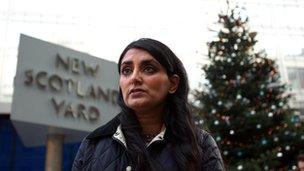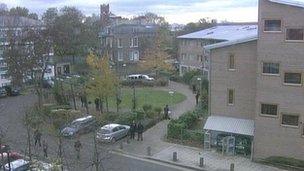Rescued 'slave' women: What do we know so far?
- Published

Aneeta Prem's Freedom Charity helped rescue the women
Details about the story of three women who were rescued after allegedly being held as slaves in a south London house for 30 years have begun to emerge. Here is what we have been told so far.
The victims
The women were identified by the Metropolitan Police as a 30-year-old Briton, a 57-year-old Irish woman and a 69-year-old Malaysian.
Their names have not yet been released, but police have said they are investigating their relationship to each other.
The police do not think they were trafficked to the UK.
Commander Steve Rodhouse said: "We believe that two of the victims met the male suspect in London through a shared political ideology, and that they lived together at an address that you could effectively call a 'collective'."
The Met believes the 30-year-old had spent her whole life in conditions of servitude.
Officers have recovered a birth certificate for the woman, but no other official papers.
Det Insp Kevin Hyland, from the Met's Human Trafficking Unit, said the women were "highly traumatised".
He said they had been "held in servitude for at least 30 years with no real exposure to the outside world".
Aneeta Prem from Freedom Charity, who helped rescue the women, said they were doing "remarkably well" considering what they had experienced.
Where were they held?
Police are making house-to-house inquiries in the Brixton area of south London as part of the investigation.
The women were rescued from an address in Peckford Place, Brixton.
The suspects
A man, 73, and a woman, 67, were arrested at 07:30 GMT on 21 November on suspicion of being involved in forced labour and domestic servitude, as well as immigration offences.
They have been released on bail but have not returned to the house where they were arrested.
The BBC understands the pair are Aravindan Balakrishnan and his wife Chanda, neither of whom are British nationals.
Police said the couple came to the UK from India and Tanzania in the 1960s, and are said to have been in the UK "for many years".
According to Marxist archives they were leading figures at the Mao Zedong Memorial Centre based in Acre Lane, Brixton, south London, in the 1970s.
Both suspects had previously been arrested by the Met in the 1970s, but the force declined to give details of what for.

Police are carrying out door-to-door inquiries in Brixton
The couple has been linked to 13 addresses across London, police have said.
The rescue
The Irish woman called Freedom Charity on 18 October and told them she had been held against her will at a house in London for more than 30 years, and said there were two others with her.
She called the charity after seeing a TV documentary about forced marriage.
Ms Prem said the woman had used the phone in secret, with the people in the house unaware that she had it.
Freedom Charity alerted the Met's Sexual Offences Exploitation and Child Abuse Command on the same day and it was passed on to the Human Trafficking Unit on 21 October.
After days of "sensitive negotiations" conducted by the charity, the British woman and the Irish woman left the house when the owners were not in, to meet with the police and workers from the charity on 25 October at an agreed location.
The women told them where the house where they had been held was, and the Malaysian woman was then rescued by the police.

Det Insp Kevin Hyland's Human Trafficking Unit has been investigating the case
All three were taken to what the police described as "a place of safety".
Commander Rodhouse said the focus was on the women's physical safety "but their emotional and mental well being also.
"To gain the trust and confidence of highly traumatised victims takes time, and this must move at their pace, not anyone else's."
How they were treated
It probably appeared to the outside world that the three women and the two suspects were a "normal" family, the police said, living in an unremarkable house in a normal street.
The police said that the women had some "controlled freedom", and officers were trying to understand the "invisible handcuffs" that were used to exert control over the women.
Police do not believe the women were sexually abused, but said they had described being beaten.
The 30-year-old is alleged to have written more than 200 impassioned letters and poems to her neighbour over an eight-year period, the Daily Mail reported., external
In one of the letters, she said she felt like a "fly trapped in a spider's web" and described her "unspeakable torment".
On 27 November, police said they were due to interview the victims under the guidance of trauma specialists.
Mr Rodhouse said there may have been "many and varied offences" against the women but that their ordeal may not be defined as modern day slavery.
"We need to maintain an open mind on what this particular incident is before we jump to those conclusions and labels," Mr Rodhouse said.
But he added: "The crucial issue for us is that, on the basis of the information that we've had indirectly from victims, clearly criminal offences have been committed. What we need to do now is to understand that in much more detail."
Mr Rodhouse also said his team had requested court papers from the inquest into the death of Sian Davies, who was fatally injured when she fell from a window of a house used by the political group in Herne Hill, south London.
Police were not called to the house at the time of her death but Mr Rodhouse is looking at which inquiries officers carried out on behalf of the coroner, who reached an open verdict.
Some 47 officers are working on the investigation, contacting 50 potential witnesses as part of their inquiry.
- Published22 November 2013
- Published22 November 2013
- Published22 November 2013